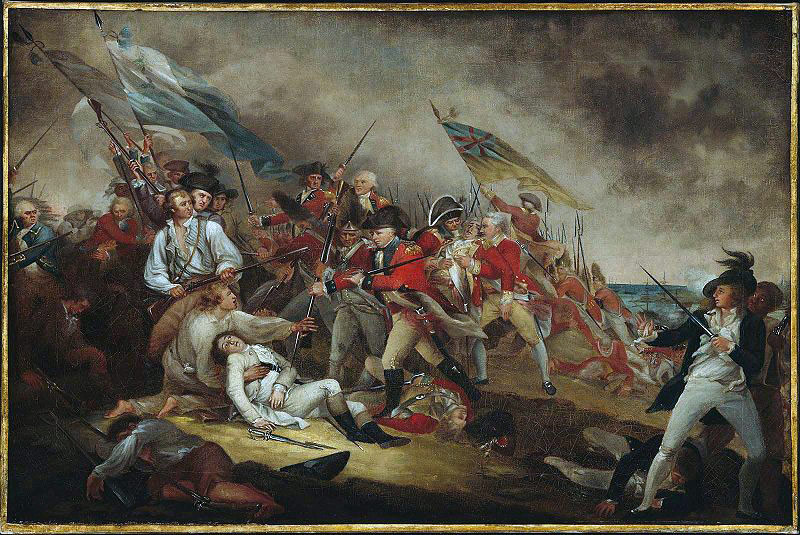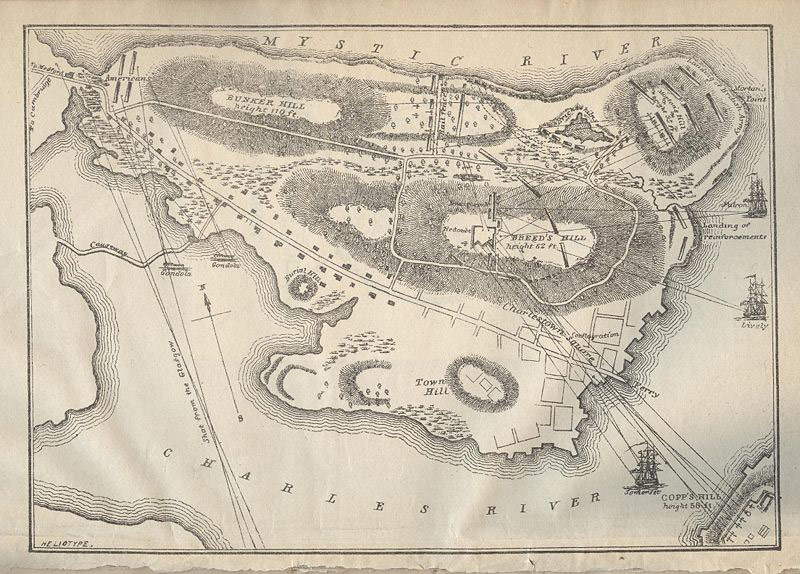 Among the most notorious battles of the American Revolution, the 1775 Battle of Bunker Hill was a pivotal battle for American Colonists in their bid for independence. Battered down by attacks from the British Army during the Siege of Boston, the events of June 17, 1775 provided much needed encouragement for the colonists as well as sending a clear message to the British that the war would not be won quickly or easily.
Among the most notorious battles of the American Revolution, the 1775 Battle of Bunker Hill was a pivotal battle for American Colonists in their bid for independence. Battered down by attacks from the British Army during the Siege of Boston, the events of June 17, 1775 provided much needed encouragement for the colonists as well as sending a clear message to the British that the war would not be won quickly or easily.
Prelude to War
On June 15, 1775, the colonists began to see signs that the British planned to occupy the area known as Dorchester Heights, an area in the southern part of Boston that provides a view of both the city of Boston and the tactically important Boston Harbor. The hill is part of the Charleston peninsula, located strategically between the Mystic and Charles Rivers. British troops began to amass forces just off of the coast, and militiamen decided that they must prevent the buildup of British forces in the area. As evening fell on June 16, Colonel William Prescott led more than twelve hundred soldiers from Cambridge to fortify the area around Bunker’s Hill. Rather than leave forces on Bunker’s Hill itself, Colonel Prescott ordered his troops to take position by digging into a 160 by 30 foot redoubt on nearby Breed’s Hill. This infuriated British General Thomas Gage, who ordered his army of more than 4600 who had previously occupied the city of Boston to capture the position. As Gage’s men waited for the tide to rise to allow troops to enter from Mystic River, the colonists used the cover of night to increase the fortifications to their position. Colonel Stark brought his troops from New Hampshire, and the number of soldiers prepared for battle rose to between three and four thousand.
The Battle of Bunker Hill
 As dawn broke on the morning of June 17th, the British found themselves in the unpleasant position of being on the wrong side of the newly fortified earthen bunker created by the colonists. General Gage sent 2300 British forces, under the command of Major General William Howe, to take the hill. As soon as the Brits could be roused from sleep, they began to fire on the entrenched colonials. The volley of fire kept up, uninterrupted except for the loading of weapons, until nearly three o’clock in the afternoon. The remaining inhabitants of nearby Charleston were forced to flee as their city was set afire by the British fleet at sea. Likely baffled by the colonists’ refusal to return fire, the British were forced to wait for the tide to turn favorable so that the barges of redcoats could advance upon the American colonists. The colonists, handicapped by a shortage of ammunition, remained behind their fortifications on Breed’s Hill as they waited, under orders to hold fire until the British soldiers were within sight of their weapons.
As dawn broke on the morning of June 17th, the British found themselves in the unpleasant position of being on the wrong side of the newly fortified earthen bunker created by the colonists. General Gage sent 2300 British forces, under the command of Major General William Howe, to take the hill. As soon as the Brits could be roused from sleep, they began to fire on the entrenched colonials. The volley of fire kept up, uninterrupted except for the loading of weapons, until nearly three o’clock in the afternoon. The remaining inhabitants of nearby Charleston were forced to flee as their city was set afire by the British fleet at sea. Likely baffled by the colonists’ refusal to return fire, the British were forced to wait for the tide to turn favorable so that the barges of redcoats could advance upon the American colonists. The colonists, handicapped by a shortage of ammunition, remained behind their fortifications on Breed’s Hill as they waited, under orders to hold fire until the British soldiers were within sight of their weapons.
When the tides finally allowed the British to take positions on land, the redcoats assembled in orderly lines to unleash a frontal assault on the colonists. As the British troops advanced, the colonists waited behind their dirt and brush fortifications until troops came within fifty yards of the fortifications. When the British were close enough, the Americans launched a deadly volley of fire which the British troops were ill-prepared to meet.
Many of Gage’s troops, expecting the colonists to be scared away by their mere presence, had fixed their bayonets and failed to even load their muskets. British forces, also suffering from a shortage of ammunition, were ordered not to fire until they were within range of the colonists. It was during the Battle of Bunker Hill that Major General Howe was purported to have given the command “Don’t fire until you see the whites of their eyes!” As the troops in their brightly colored uniforms and carrying heavy equipment marched in neat lines through farmer’s fields and over stone walls, the colonists continued to fire from behind embankments.
Shocked by the American colonists’ resistance, the troops fell back. Major General Howe ordered his troops to advance again, demanding that they walk over the bodies of their dead and wounded on a second assault, only to be forced back again by the colonists. On their third advance, the British soldiers were able to break through the colonial lines and overrun their meager fortifications to claim the hill. American soldiers, defeated as much by lack of ammunition and supplies as by the military capabilities of the British Army, were forced to flee.
The Aftermath
While the battle was a victory for the British, since they were able to capture Breed’s Hill, the losses suffered dealt a devastating blow to the redcoats. Of the more than 2300 men who advanced at Major General Howe’s order, 226 were killed and another 928 were wounded. The American forces took heavy losses as well, with 139 killed and 278 wounded. The Battle of Bunker Hill lasted a mere three hours, but it was among the deadliest in the American Revolution. Despite their losses, many of the American colonists felt that the battle had provided them with a victory in other ways, sending a clear message that the American soldiers were able to take a stand against the British army and win by using traditional war tactics. American colonists everywhere realized that the British Army was not an invincible force too mighty to reckon with, and more men were willing to join the fight for independence. The battle also strengthened the will of colonists to fight, and surprisingly, created sympathy for the American cause back in England.
Shortly after, George Washington would lead his own contingent of men to Dorchester Heights, forcing the British to give up their hard-won land. The British soldiers who had already occupied the city of Boston made no attempt to engage the colonists away from the relative safety of the city until they awoke in April to find Ticonderoga’s cannon pointed directly at them. The Battle of Bunker Hill is arguably the most important battle fought between the British and the newly formed American militia not because it was a victory in fact, but because it gave the American people a rallying cry as they marched onward through the bloody war for American Independence.